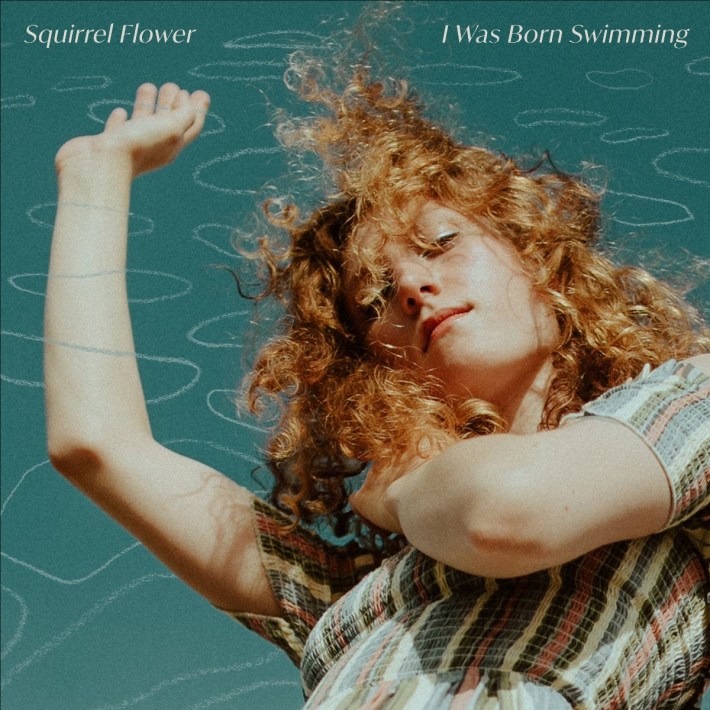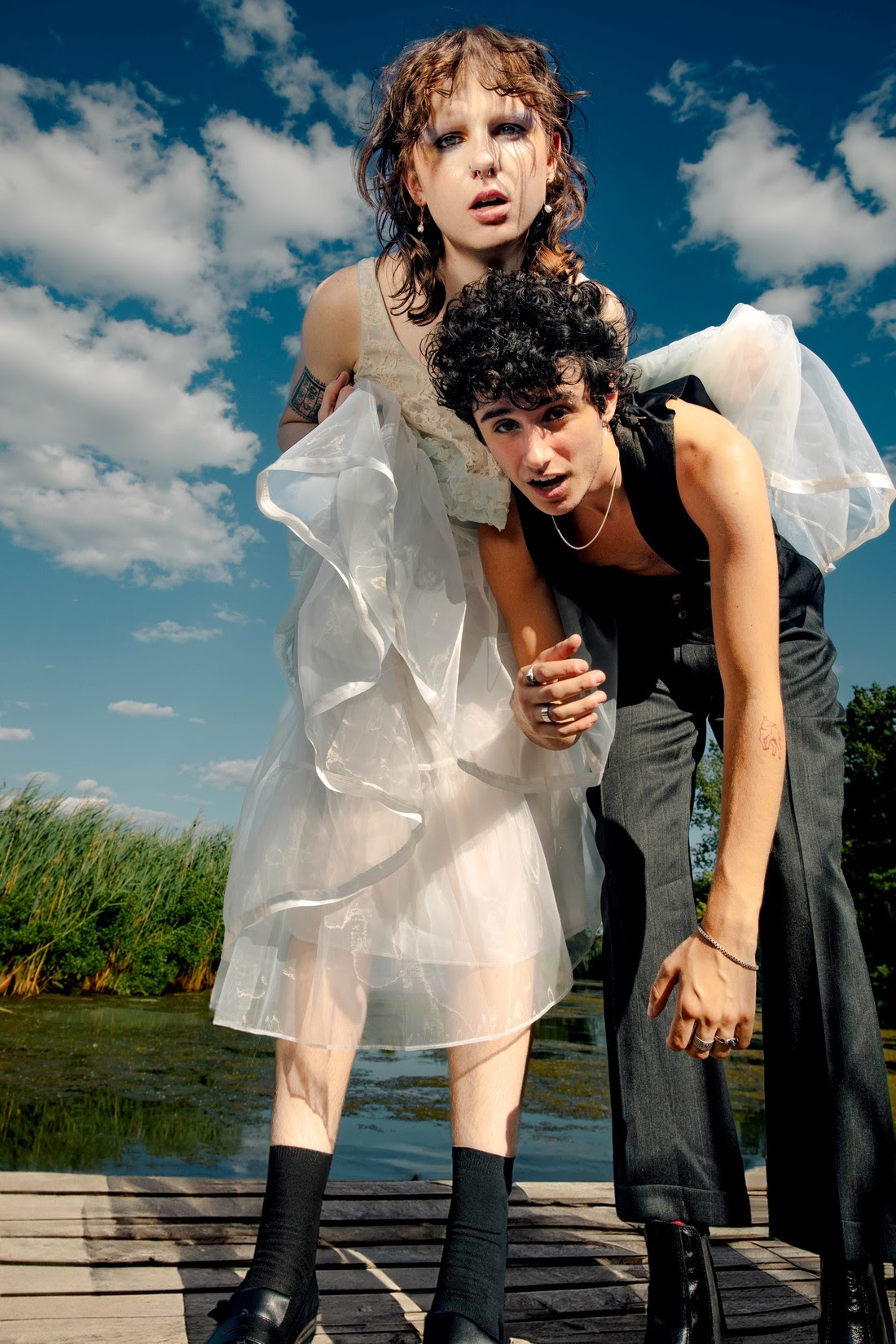No matter how vulnerable or genuine a musician’s work is, when they get up on stage there is always an added performative element. Whether under their own name or an alias, they’re recreating a past state of mind -- one that still might be fresh, but is reconstructed nonetheless. Ella O’Connor Williams considered this when deciding to make music under her childhood moniker Squirrel Flower. After releasing a few albums under her birth name, she opted to change it up a bit when her music started to evolve.
She landed on a vibrant and playful phrase with an origin she can’t recall. When people critique the name, she gets defensive and rightfully protective over a piece of her younger self: something she recognizes in various ways through her music. Her debut album I Was Born Swimming is built from flashes of her past -- from reflections about her birth to moments when she was attending college in Iowa -- with moody country tracks that detail tatters of lost relationships and crunchy rock songs that document her growing fortitude.
When Williams and I speak, she’s calling me from her hometown of Arlington, MA, with a couple hours to kill before her shift at the local coffee shop. Williams has been back in Arlington since graduating from Grinnell College in December of 2018. Her first semester away from home wasn’t the easiest. The transition from just 20 minutes outside of Boston to a rural farm town led to homesickness, depression, and taking the next semester off. It was during this resting period that she started making music as Squirrel Flower. She soon realized that time in Iowa had left its creative mark.
"I had written all these songs that were different from what I had been making in high school," Williams explains. "I think the songs I was writing were influenced by just how stark the winter and the fall there was." She contemplated transferring, but decided to stay. "It was a great decision because I ended up being really happy there," she says.
Her music as Squirrel Flower isn't something you’d find out of the hippie movement per se, but there are remnants of folk, twinges of Joni Mitchell or Neil Young. She began releasing EPs in high school, self-taught and inspired by British folk and 2010s acts like Bon Iver and Laura Marling. (Learning from the latter, she explained to me, was a blessing considering Marling’s songs are in “crazy open tunings” that gave her “a totally different way of playing” guitar.)
It wasn’t until her second year at Grinnell -- where she double-majored in gender, women, and sexuality studies and studio art -- that Williams started experimenting with distortion and electric guitar. She liked how powerful she sounded. Moving forward, she was determined to balance the blunt spaciousness of her folk music and powerful grandiosity of electric guitar-based rock.
After returning to school in Iowa, Williams got involved with the music scene at Grinnell, which she describes as small, warm, and kind. She continued to embrace the shift that was happening in her music based on her surrounding topography. "I felt affected by how open everything was there," she says. "Where I was in Iowa, there were hills and trees but everything is spaced out differently. There's so much space. The land there is very politically loaded because it's stolen land. I think 99% of the land is privately owned because there’s so many factory farms."
For a few minutes Williams talks to me about the conflict over indigenous land; it's an important part of where she went to school, with friends involved in activism and research. She also tells me about the area’s biodiversity, its rich soil that makes it desirable. "You're in this landscape that at first you're like, 'Wow, this is so beautiful and stunning,’" she recalls. "And then underneath it is a sinister thing."
The structure of her songs wasn't the only aspect of her music engaging with her atmosphere. Her forthcoming 12 tracks either seek liberation or are ready to put up a fight. I Was Born Swimming's sprawling and taxing opener "I-80" finds Williams ascending like a phoenix as she recovers from past anguish. "Good thing my body is for my eyes only/ I own it and I will attack," she sings on the thorned pre-chorus for "Slapback."
Elsewhere, I Was Born Swimming is overcome with images of opportunistic highway and pensive rides outlined by misty headlight beams. Her imagery suits the modest reverb that stretches out, like road markers and trees beginning to blur alongside the concrete pathway. "Midnight workers, I know the darkness of these roads as well as you do," her voice is heavy on "Belly Of The City" as she rides away. The thousands of miles traveled between Boston and Iowa over the last two years have seeped into Squirrel Flower’s music. These songs are a bilateral route -- one that celebrates her origin or directs us on our own escape from the shadows.
Although Williams plays with metaphor and visceral lyricism, the title I Was Born Swimming is more literal than you might think. Williams was born en caul -- born surrounded by the amniotic sac. Some call this phenomenon "born with a veil" and believe that it's a sign of good luck; there are a lot of strange superstitions in Nordic countries surrounding it, including putting one under the bed of someone dying in order to make their passing easier. Williams doesn't believe in all that but tries to make sense of it. "If there is any mysticism around the way that I was born and the way that I am, it's my ability to make art and share it with people," she says to me, later afraid she sounds too cheesy.
I try to connect the dots of how the album's peppering of childhood nostalgia and appreciation came to be. Williams begins by telling me a story of what I imagine to be the gnarliest cast a child could wear. She endured multiple surgeries for the removal of a cyst in her femur bone from ages five to nine. "They're crazy pictures because they asked me what color I wanted my cast to be, but after they gave me the drugs," she says. "So I woke up with a fucking green and purple spiral straight full-leg cast." While I think her choice of colors is fun, she describes it as a "ridiculous Dr. Seuss-looking thing."
It was in that cast that she was given her first guitar by her dad, Jesse Williams (a blues bassist that plays on her album). That summer was filled with in-bed activities, from listening to music to writing stories. Aside from producing some wild photos, it was integral for Williams creatively, giving herself space to be bored and experiment. “I very much lived in my head,” she reflects on the significance of those times. “That feels important and I want to honor that history.”
It took a few tries for I Was Born Swimming to come to fruition. Only a couple tracks -- "Red Shoulder" and "Streetlight Blues" -- came out of her first recording session a few years ago. A year later, she finished most of the album at the Brooklyn studio Rare Book Room with Gabe Wax, who’s worked with Adrianne Lenker and Palehound. A lot of the raw openness of the album was a result of their improvisational sessions.
However, Williams recorded the title track, the final song added to the album, in that childhood bedroom in Arlington. "I Was Born Swimming" is a fitting conclusion that brings us back to Williams’s origin in more ways than one; it's the album’s final breath about Williams' first. "It's reflection. You go through the whole album of all of these different moods and ideas and feelings," she says. "Finally it's like, 'Okay, this makes sense. This is who I am and I feel very comfortable in myself.' It's an exhale."

I Was Born Swimming is out 1/31 on Polyvinyl/Full Time Hobby. Pre-order it here.






